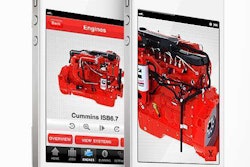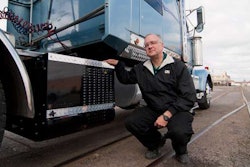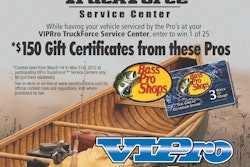
According to reports like this one in the Australian press, a group of truckers working Southern California ports for Australian firm the Toll Group — employee drivers, mind you — are holding an election for Teamsters representation this week. It’s an interesting development, given the predominance of independent contractor owner-operators among port dray drivers around the nation, though as noted above all of Toll’s drivers are apparently piloting company-owned equipment. (Any readers out there who know of conflicting intelligence or other such cases, definitely let us know here in the comments.)
The Teamsters have a widely-reported-on and ongoing goal of increasing the union’s presence at the ports, part and parcel of that being what the Journal of Commerce Online in a report from earlier this year about the Toll campaign dubbed attempts to “have owner-operators classified as employee drivers so they can be unionized in accordance with national labor law.” As the online JOC went on to say, “Independent contractors can not be organized by a union.”
Which all serves as a great reminder of the reason to become an owner-operator to begin with: Independence.
The various right-of-control tests applied to determine whether an employer-independent contractor relationship is valid under the law (many of which pose a set of conditions having to do with how much control the independent contracting entity may have over its loads, maintenance and other factors) have been looked at by each successive national Congress going back almost a decade at this point. Most proposed national bills have been pieces of union-favored legislation, which would make the IC designation more difficult to maintain, if successful. As we’ve written about time and again in both Overdrive and, to a lesser extent, Truckers News, such legislation could make new union elections like Toll’s more and more widespread — and small business ownership in both localized and more long-haul trucking more difficult to establish.
The reason for that? The chilling effect a prominent piece of cumbersome independent contractor legislation or a prominent misclassification lawsuit could have on existing owner-operator-contracting fleets around the nation. Tools carriers use to help owner-operators (such as administration of maintenance escrows, for instance) could become scarce, serving as red flags for a lack of operator/contractor control and opening up carriers to legal challenges. We’re not there yet, though the fear is we could go there in future if the issue continues nationally and if state revenues continue low.
My most recent writing about this subject came late last year, a story about some alternative leasing models that have grown up in the wake of the last decade’s attention to the carrier/owner-operator relationship. Find it here or via this Channel 19 post. Also, Overdrive Contributing Editor Jill Dunn rounded up recent state/federal attention to IC classification early in March here.











